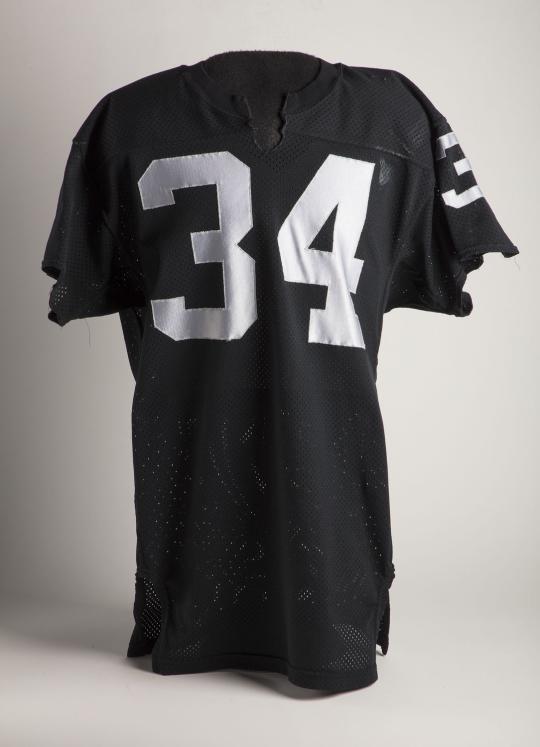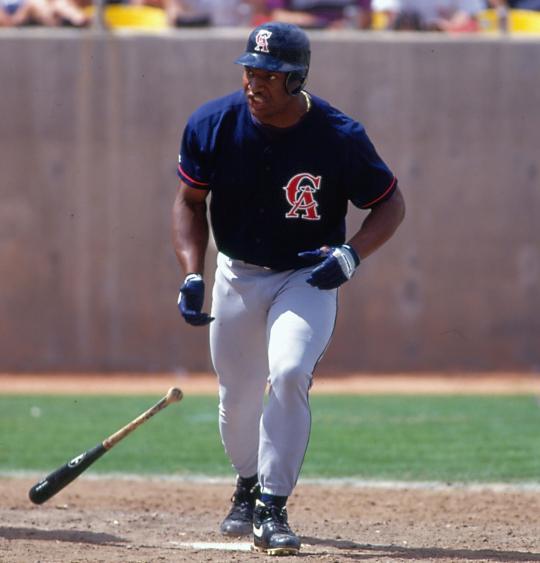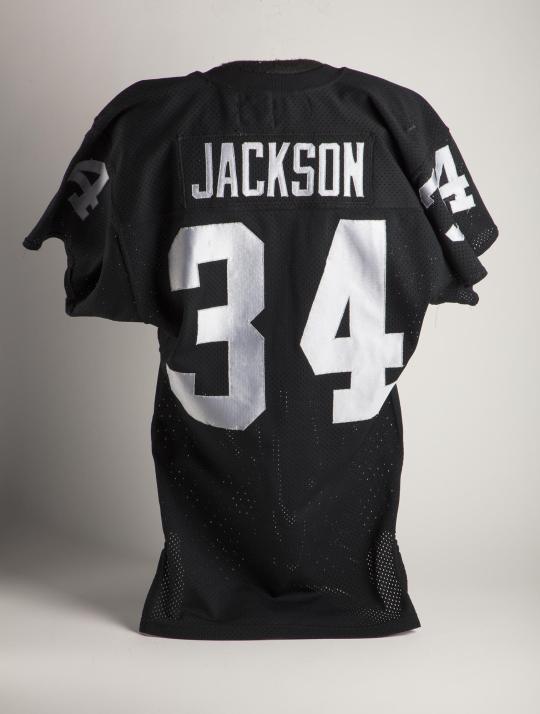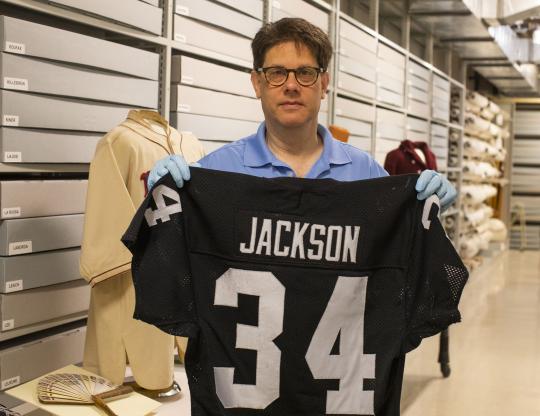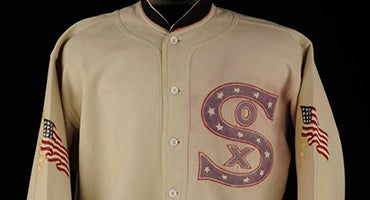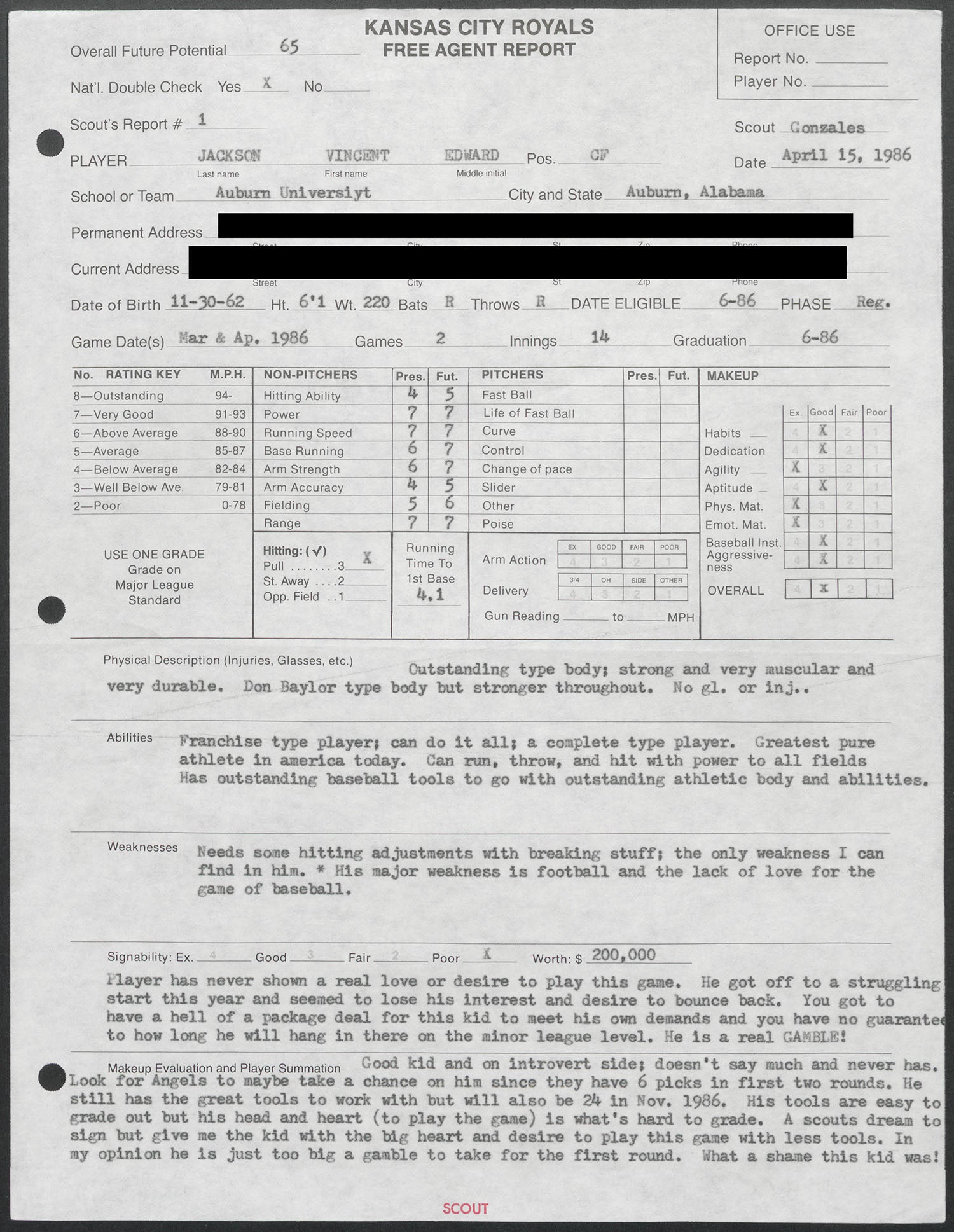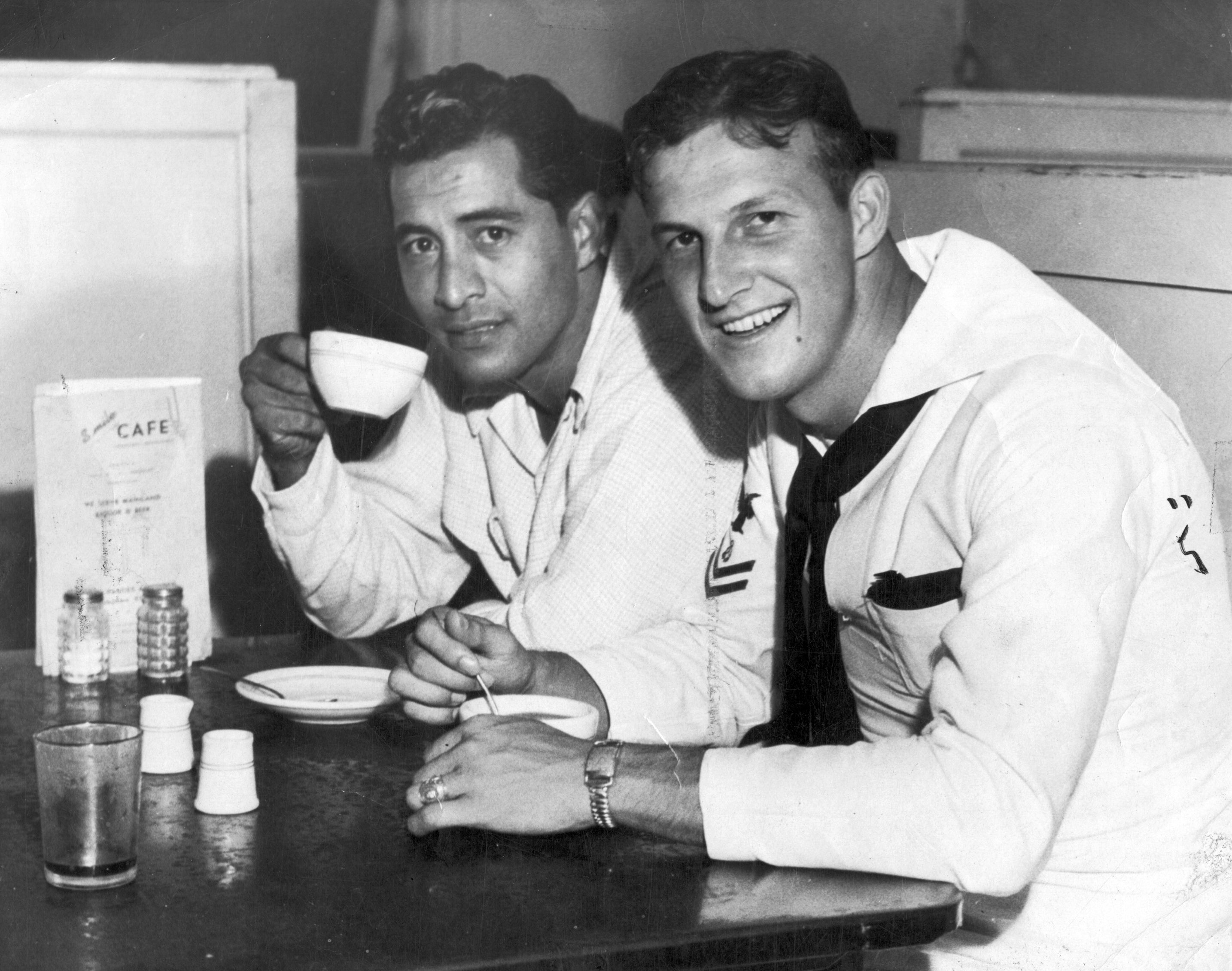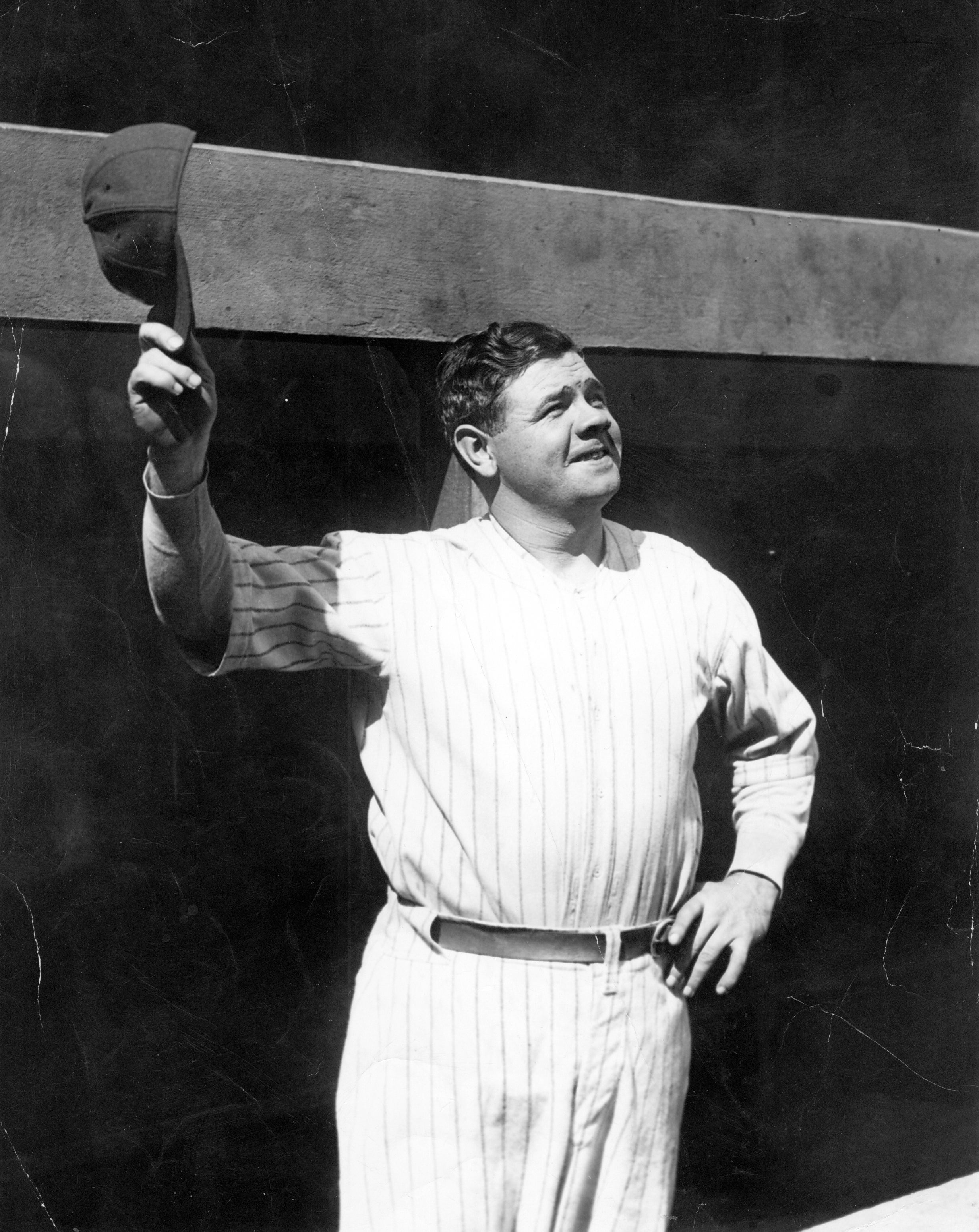- Home
- Our Stories
- #GoingDeep: Research reveals Bo Jackson’s final Raiders uniform is preserved in Cooperstown
#GoingDeep: Research reveals Bo Jackson’s final Raiders uniform is preserved in Cooperstown
It was an innocuous-looking football jersey, possibly worn by a famous athlete, but with little known backstory.
But after being stored away for three decades, it took the detective-like efforts of an intrepid curator to make an important discovery pertaining to a game-used artifact from one of the greatest two-sport stars the country has ever seen.
Bo Jackson isn’t a member of the National Baseball Hall of Fame. But in the late 1980s, there may not have been a more famous ballplayer.
Add in the gridiron exploits of the 1985 Heisman Trophy with Auburn University, his time with the Los Angeles Raiders as well as his “Bo knows …” television commercials. And with the ability to run up outfield walls and bowl over linebackers, the future looked bright for the 6-foot-1, 220-pound outfielder/running back.
To put it in perspective, simultaneously playing at a high level in both baseball and football was practically unheard of.
In the midst of Jackson’s national popularity, the National Baseball Hall of Fame and Museum approached the Raiders for an artifact donation. The football team delivered, sending in early 1991 a Raiders signature silver-and-black football jersey with Jackson’s name across the back along with his familiar No. 34, but no other details on the undated item’s prior usage.
In a letter to Raiders executive assistant Al LoCasale, dated March 4, 1991, Hall of Fame registrar Peter Clark wrote: “On behalf of the staff of the Baseball Hall of Fame & Museum I wish to thank you for sending along the #34 jersey worn by Bo Jackson, to be used in our ‘Today’s Stars’ exhibit in the museum.
“I am sure the fans will be pleased to see this memento from Bo’s football career, which only goes to prove the immense talent of the man. Together with his baseball career, he is one of the true superstars of our country at this time.”
Jackson, the only athlete to be selected to participate in both an MLB All-Star Game and an NFL Pro Bowl Game, reached his two-sport mastery in 1989 when the Bunyanesque hero rushed for 950 yards with the Raiders after hitting 32 home runs and driving in 105 runs for the Royals.
The football jersey wasn’t the first three-dimensional Jackson artifact in the Museum, as the Royals donated team caps worn by him during both the 1989 regular season and 1989 All-Star Game, in which a first-inning homer helped earn him the Midsummer Classic MVP Award.
Fast forward 30 years after the Jackson football jersey donation and Hall of Fame senior curator Tom Shieber was researching the jersey for potential use in the “Hall of Fame Connections” YouTube series. What he discovered was as shocking as it was thrilling.
“I am certain that this is the very jersey Bo wore in the 1990 AFC Divisional Playoff game of Jan. 13, 1991, in which the Raiders beat the Bengals, 20-10, at the Los Angeles Coliseum,” Shieber said. “This was the game in which Bo seriously injured his hip and, alas, was the last NFL game Jackson ever played. As far as I can tell, it is the only jersey he wore during that game.
“In short, this is the jersey from one of the most important and influential games in the career of one of the greatest athletes of our time. I believe the jersey was washed after the game, as many grass stains that are clearly visible in pictures taken of Bo during that game are now either gone or faded. Nevertheless, there are many unique features seen in photos – such as scuff marks, tears and imperfections – that can also be seen on our jersey.”
As Shieber explained, it’s common for Hall of Fame curators to research artifacts prior to their inclusion in an exhibit. After discovering Museum records that left more questions unanswered than answered, Shieber attempted to try photo-matching the Jackson jersey with images he could find on the internet from the early 1990s. Fortunately, early in the process, Shieber came to realize what he had stumbled upon.
“The first thing I asked myself was is this really a game-used Raiders jersey. That was the first thing that struck me because it's extremely plain,” Shieber remembered. “And I didn't know when the Raiders wore that kind of jersey, but then I thought let’s just go to a game from circa 1991 and see if they were like that. And, in fact, they were.
“Then I thought, well, maybe I can actually narrow it down. So I started looking into it, and I came across a photo from that the Jan. 13, 1991, AFC Divisional playoff game against the Bengals.”
Unfortunately, with the 28-year-old Jackson riding high at the height of his athletic prowess, his playing career on the gridiron and diamond took a devastating hit during that infamous late afternoon postseason tilt. In front of 92,045 spectators, which included on the Raiders’ sideline Magic Johnson, Evander Holyfield and M.C. Hammer, Jackson rushed six times for 77 yards before his day ended with a left hip injury on the second play of the second half after a 34-yard breakaway run down the right sideline. The injury apparently occurred as Jackson planted his left leg and tried to twist away.
“It was a run that went to the left side and I was playing right. I was in backside pursuit when he broke into the secondary,” explained Bengals inside linebacker Kevin Walker. “By the time I got to him, he had built up a lot of groundspeed. I got a hold of his legs pretty good and he was trying to break loose. It was nothing, really. Just an ordinary tackle.
“Once it happened, I got up and he got up right behind me. A few seconds later I turned around and he was on the ground again. I thought he was winded or something. I really didn’t think anything about it.”
Initially, Jackson’s hip injury was considered minor, reported at the time to be only a hip pointer, and he was listed as doubtful for the following week’s AFC title game versus the Buffalo Bills. Raiders’ coach Art Shell said that Jackson had a “limp in his giddyup.” But the final prognosis was dire.
The injury in what proved to be Jackson’s final football game was a dislocated and fractured left hip socket. In October, when Jackson failed his Raiders physical, his football career essentially came to an end.
The only player in NFL history to record two runs in excess of 90 yards, Jackson played 38 games in four seasons, only joining the Raiders in October when the baseball season was over. He finished with 515 carries for 2,782 yards, averaging of 5.4 yards per carry.
In March 1991, one of the most recognizable athletes in the world was released by the Royals after the team determined his hip injury would not allow him to play baseball that year.
“It knocked me to the floor when I heard about it,” said Royals legendary third baseman and future Hall of Famer George Brett at the time. “I knew the injury was bad because I’d asked our trainers about Bo’s chance to play this year and they’d said, ‘Slim and none.’”
After Shieber’s dogged research efforts concluded that indeed the Hall of Fame was in possession of the Raiders jersey from his ill-fated last football game, he shared the exciting news with colleagues.
“I disseminated this information to co-workers in the Museum, which is what I do with other discoveries I make once I feel good about something significant,” Shieber said. “There are many discoveries in which we don't need to contact people, but every once in a while you make what I think is a pretty significant discovery about an object in our collection.”
Leila Dunbar, an independent appraiser with an expertise in sports who has worked with the Hall of Fame in the past, said of the surprising Jackson jersey discovery: “This 1991 Raiders Jackson jersey represents the promise of what could have been and how chance plays such a role in sports. We saw Bo's greatness on both the baseball and football fields and in an instant a devastating injury cut short a Hall of Fame career, possibly in both sports. We knew Bo, but wanted to know more.”
Much like such fictional characters as Sam Spade, Sherlock Holmes or Hercule Poirot, Shieber loves the detective story part of his job.
“I research baseball artifacts all the time, it's just that most of the time you don't get a really cool story. And I suspect that that's what happens with real life detectives,” he said. “If you don't do it at all, you'll never get those moments. But every once while you find out something different and it really pays off with quite a ‘wow’ moment.
“This isn't just any jersey that Bo Jackson wore; this is the last football jersey he ever wore. That is significant for any football player, but for a football player whose career ended in such a tragic way as Bo’s hits different. It’s 30 years later and people are still talking about Bo Jackson. This jersey allows us to tell his really remarkable story.”
Despite the hip injury, Jackson signed a baseball contract with the Chicago White Sox in April 1991, vowing to return to the ballfield that season.
Beating the long odds, the athlete with a rare gift came back for the final month of the 1991 baseball season and hit .225 with three homers and 14 RBI in 71 at-bats. But the injury only got worse the next spring and he had to undergo a total hip replacement.
After missing the 1992 season rehabbing, he defied logic again and returned to play professional sports with an artificial hip for the White Sox in 1993 and the California Angels in ’94. He retired from the field of play for good after the strike-shortened 1994 baseball season.
In eight injury-plagued big league seasons between 1986 and 1994, Jackson batted .250 with 141 home runs and 415 RBI.
“There's no reason for anyone to feel sorry for what happened to me, or what might have been,” Jackson once said. “I didn't play sports to make it to the Hall of Fame. I just played for the love of sport.
“I can probably say, if I wanted to be in the Baseball Hall of Fame, I could have been easily. If I wanted to be in the (Pro) Football Hall of Fame, I could have done that too. But I can say also that I wouldn't go back and change a thing.”
Bill Francis is the senior research and writing specialist at the National Baseball Hall of Fame and Museum

